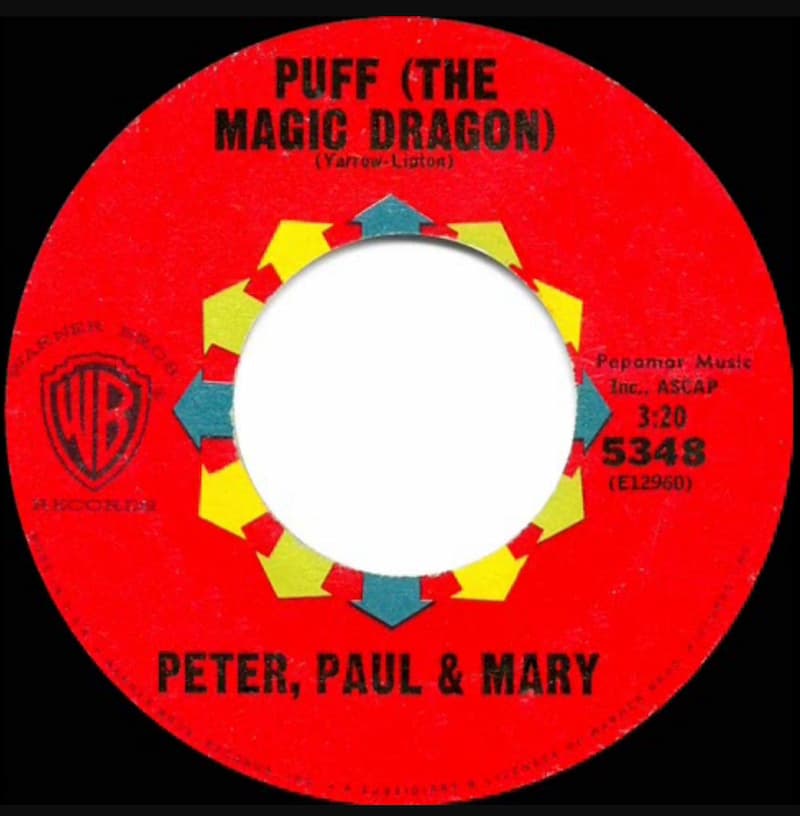
“Puff, the Magic Dragon” is far more than just a folk tune; it’s a legend crafted from the serendipitous union of a young poet’s words and the creative heartbeat of one of folk music’s most enduring trios. The origins trace back to 1959, when a 19-year-old Cornell University student named Leonard Lipton penned a poignant poem, inspired by Ogden Nash’s 1936 “The Tale of Custard the Dragon.” This poem was left behind on a typewriter, where Peter Yarrow, then a senior at the same university, discovered it and instantly saw its potential as a song. With music set to Lipton’s heartfelt verses, Yarrow introduced the piece to Peter, Paul and Mary, a folk group formed in 1961, igniting a cultural phenomenon.
Initially recorded in 1962 for their second album, Moving, the song was officially released as a single in January 1963 under Warner Bros. Records. It soared to No. 2 on the Billboard Hot 100 by May, narrowly outpaced by Little Peggy March’s hit “I Will Follow Him,” and reigned at No. 1 on the Billboard Middle-Road Singles chart for two weeks. Its powerful impact stretched beyond folk circles, reaching No. 10 on the R&B Singles chart and holding a presence for 14 weeks on the Hot 100.
The narrative woven by the song is one of innocence, friendship, and the inevitable loss of childhood, revolving around the fantastical dragon Puff residing in the mystical land of Honalee, and his cherished companion, a boy named Jackie Paper. Their adventures, filled with childlike wonder, come to a bittersweet pause as Jackie grows up and leaves Puff behind. Created under the watchful eye of producer Albert Grossman at RCA Studios in New York, the track showcases the exquisite harmonies of Yarrow, Paul Stookey, and Mary Travers, stitched together by acoustic strings and bass.
The meaning of the song has long been the subject of bewildering speculation. In 1964, Newsweek controversially linked the lyric “Jackie Paper” to rolling papers, and “Honalee” to hashish—a claim firmly denied by both Yarrow and Lipton. In a legendary 1973 concert at Sydney Opera House, Stookey humorously staged a mock trial to “acquit” the song of drug-related charges, culminating in warming audience sing-alongs filled with laughter and camaraderie.
During this era of monumental social change, “Puff, the Magic Dragon” became a beacon for the folk movement. After the trio’s 1962 debut album featured the anthem “If I Had a Hammer,” their 1963 performance of “Puff” at the celebrated March on Washington only amplified their prominence. The influence of the song even expanded into television and film, resulting in three CBS TV specials from 1978 to 1981 where Yarrow portrayed Jackie’s father, as well as a 1978 animated film narrated by Burgess Meredith.
The song’s life didn’t stop there: live renditions, including their notable 1965 BBC performance and a 1986 25th-anniversary concert, kept the magic alive. It inspired diverse covers by artists like Nina & Frederik, Jackie DeShannon, and Broken Social Scene. A bestselling 2007 book co-authored by Yarrow, Lipton, and illustrator Eric Puybaret added a tender epilogue, envisioning Jackie Paper’s daughter discovering Puff’s enduring friendship, evoking hope amid nostalgia.
An unexpected legacy unfolded during the Vietnam War when the AC-47 Spooky gunship earned the nickname “Puff the Magic Dragon” due to its formidable firepower—demonstrating the song’s reach beyond music into military lore. More recently, Elon Musk honored the song’s mythical influence by naming SpaceX’s Dragon spacecraft after it.
Peter, Paul and Mary’s dedication to crafting a modern Weavers-style sound ensured that “Puff” would not only captivate children’s imaginations but resonate across generations. In a gesture toward inclusivity, Yarrow later adapted the lyrics to welcome “girls and boys” instead of only “little boys.” Although the original poem included an additional stanza about Puff’s new friend, it was notably omitted from the song—a choice that adds to the mystery and charm of the beloved story.
The song charted in tandem with the rise of monumental folk hits such as Bob Dylan’s “Blowin’ in the Wind,” but its place in popular culture remains unique—etched as a children’s classic on their 1969 album Peter, Paul and Mommy. This timeless ballad of a magical dragon and a lost childhood continues to stir emotions, edify the soul, and spark the imagination of listeners old and new.